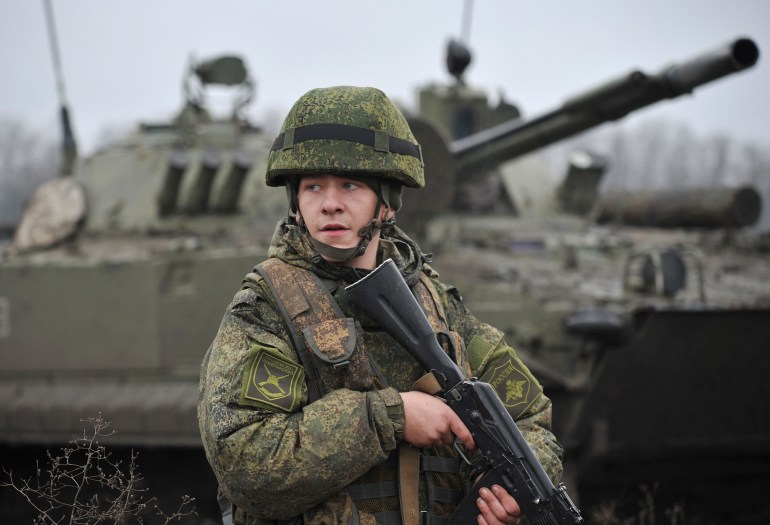Latest Ukraine updates: UK PM warns of ‘clear danger’ to Ukraine
Ukraine news from February 1: Johnson and Zelenskyy meet in Kyiv amid flurry of diplomatic activity over Ukraine crisis.

British Prime Minister Boris Johnson and Ukrainian President Volodymyr Zelenskyy have discussed the “imminent” Russian military campaign as President Vladimir Putin said Washington is using Kyiv as a tool against Russia.
Tuesday saw a flurry of diplomatic efforts to avert a threat of war in Ukraine, with officials from several sides in the crisis involved in high-level talks.
Keep reading
list of 4 itemsUS and Russia spar over Ukraine crisis at UN Security Council
How are Russian media outlets portraying the Ukraine crisis?
Ukraine crisis: Why is Germany out of step with the US, Europe?
The Russian president hosted Hungarian Prime Minister Viktor Orban in Moscow, while US Secretary of State Antony Blinken and Russian Foreign Minister Sergey Lavrov spoke by phone.
Russia has spurred fears of war by massing more than 100,000 soldiers near the Ukraine border but says it has no plans to invade.
Instead, it accuses NATO of undermining the region’s security and wants the alliance to cease military activity in Eastern Europe and block Ukraine from membership.
The live blog is now closed, thank you for joining us. Here are the updates for February 1.
Canada advises citizens to avoid travel to Ukraine amid ‘Russian threats’
Canada has told its citizens to avoid all travel to Ukraine citing “ongoing Russian threats and the risk of armed conflict,” according to a travel advisory released.
“If you are in Ukraine, you should leave while commercial means are available,” Canada’s advisory added.
Russia cites 1999 charter text for insistence on ‘indivisible security’
Russia said it would insist that Western governments respect a 1999 agreement that no country can strengthen its own security at the expense of others, an issue it argues is at the heart of the Ukraine crisis.
Foreign Minister Sergei Lavrov said he raised the matter in a conversation with Antony Blinken, and that he accepted the need to discuss it further.
In the US readout of the call, the State Department said Blinken urged Russia to immediately pull back troops from Ukraine’s border and said Washington was willing to continue talking about mutual security concerns.
US leans on Brazil’s Bolsonaro to scrap Russia trip: source
The US government urged Brazilian President Jair Bolsonaro to cancel a visit with President Vladimir Putin in Russia due to rising tensions over its troop build-up near Ukraine, a person with knowledge of the matter told the Reuters news agency.
The diplomatic push, first reported by newspaper Folha de S Paulo, appears to be part of a global effort by the US to isolate Russia amid concerns of a possible Ukraine conflict.
For Bolsonaro, a far-right populist who lost a key ally in the 2020 electoral defeat of former US President Donald Trump, the trip, planned for this month, represents a chance to establish his global clout as he faces an uphill battle to win re-election this year.
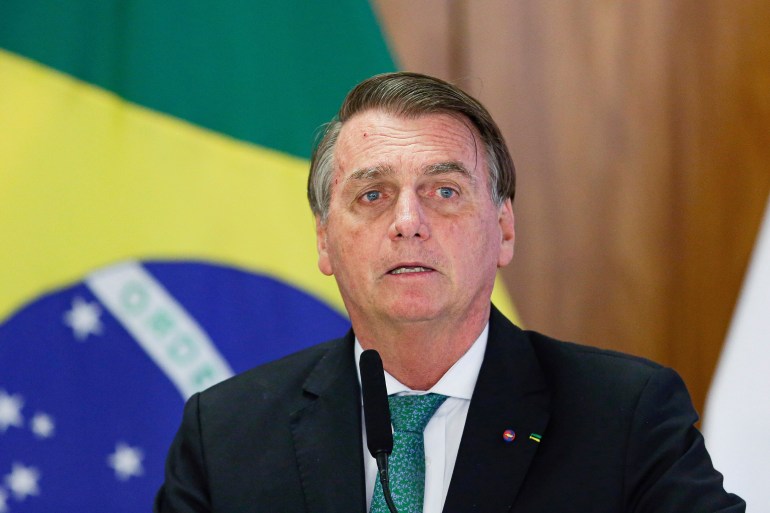
Conflict with Russia means full-scale war in Europe: Zelenskiyy
The Ukrainian president said that a military conflict with Russia would not just involve Ukraine but lead to a full-scale war in Europe.
Speaking alongside Boris Johnson in Kyiv, Zelenskiyy said the leaders had discussed steps to contain Russia, adding nobody could predict what would happen next in Ukraine’s standoff with Moscow.
Zelenskiyy said Ukraine was taking a responsible approach to the Minsk ceasefire agreement on ending the war in eastern Ukraine but disagreed with Russia on the sequencing of how the deal would be implemented.
UK’s Johnson says Putin is holding a gun to Ukraine’s head
The Russian president is holding a gun to Ukraine’s head in an effort to force a change to the architecture of European security, Boris Johnson said, stressing he was not exaggerating Russia’s threat.
“This is a clear and present danger. We see large numbers of troops massing, we see preparations for all kinds of operations that are consistent with an imminent military campaign,” Johnson said, adding he would talk to Putin on Wednesday.
“It’s about the whole European security architecture, because be in no doubt about what I think President Putin is trying to achieve here. I think that he is trying, by holding a gun as it were to the head of Ukraine, by intimidating Ukraine, to get us to change the way we look at (European security).”
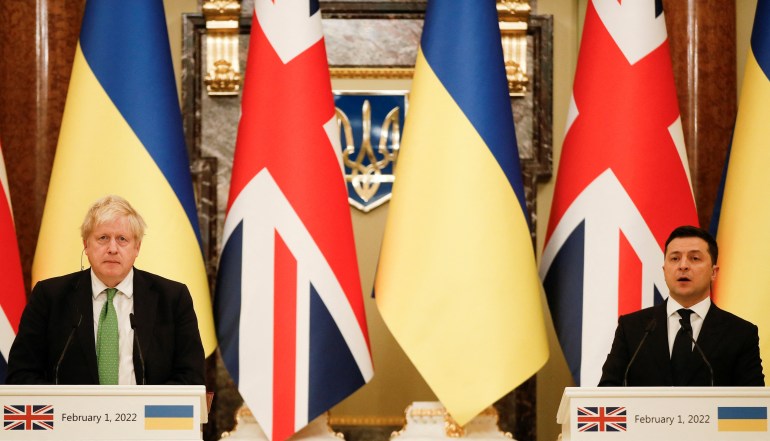
Putin says hopes for solution to Ukraine crisis, but ‘not simple’
The Russian president said that he hoped that Moscow and the West will find a solution to the raging security crisis over Ukraine, but also accused Washington of using Kyiv as a “tool” to contain Russia.
“I hope that in the end we will find this solution, although it will not be simple,” Putin said, though he added that Washington’s main goal was “to contain Russia, and Ukraine is just a tool to get us involved in some armed conflict”.
Putin discusses the Ukraine tensions with Hungary’s Orban
The Russian president discussed tensions over Ukraine with his visiting Hungarian counterpart.
Orban, who has forged close ties with Putin, putting NATO member Hungary in a unique position, stressed that no European leader wants a war in the region and avoided taking sides on the issue.
Putin has not spoken about the issue since late December.
If Russia isn’t invading Ukraine, pull back troops now, Blinken tells Lavrov
US Secretary of State told his Russian counterpart Lavrov that this would be the time to pull back Russian troops from the border with Ukraine if Moscow is not intending to invade, a senior State Department official told reporters.
“If President Putin truly does not intend war or regime change, the Secretary told Lavrov then this is the time to pull back troops and heavy weaponry and engage in a serious discussion….that can enhance collective European security,” the official said, speaking to reporters on a call on condition of anonymity.

Blinken urges Russian de-escalation
The US secretary of state has told Lavrov Washington seeks an “immediate Russian de-escalation” of the crisis and the “withdrawal of troops and equipment from Ukraine’s borders”, the State Department said.
Blinken also emphasised Washington’s willingness to continue a “substantive exchange” with Moscow on mutual security concerns during the pair’s call, the department spokesman Ned Price added.
The secretary reiterated the US commitment to Ukraine’s sovereignty and territorial integrity, as well as the right of all countries to determine their own foreign policy and alliances, Price also said.
Russian forces hold military drills in Transdniestria
Russian forces have undertaken military exercises in the breakaway Moldovan region of Transdniestria that borders Ukraine to practise covert movements and firing grenade launchers, according to the country’s defence ministry.
The ministry said its 1,000-strong contingent of troops and peacekeepers stationed in Transdniestria, known as the Operational Group of Russian Forces, practised firing at targets that imitated advancing infantry and hardware. The forces also practised taking up firing positions, it said.
Russian peacekeepers were first deployed to Transdniestria after it fought a brief war with Moldova in 1992 and declared itself an independent state. It remains unrecognised by any country, including Russia.
Ceasefire violations increase in eastern Ukraine
As tensions soar, ceasefire violations are rising along the contact line which separates Ukraine and two breakaway territories in the country’s east controlled by Russian-backed forces.
Read more here.
UK PM Johnson arrives in Ukraine
British Prime Minister Boris Johnson has arrived in the Ukrainian capital to meet Zelenskyy.
“As a friend and a democratic partner, the UK will continue to uphold Ukraine’s sovereignty in the face of those who seek to destroy it,” Johnson said on Twitter before landing.
Travelling to Kyiv today to meet President @ZelenskyyUa for talks.
As a friend and a democratic partner, the UK will continue to uphold Ukraine's sovereignty in the face of those who seek to destroy it. pic.twitter.com/qmKBmNJhhx
— Boris Johnson (@BorisJohnson) February 1, 2022
Qatar says it cannot unilaterally meet Europe’s gas needs
Qatar, one of the world’s top natural gas exporters, will not be able to unilaterally meet Europe’s energy needs should the Ukraine-Russia crisis affect existing supplies, the country’s minister of state for energy has said.
Saad Sherida al-Kaabi expressed hope in a statement that “tensions in Europe can be resolved diplomatically, so that all suppliers can work together to ensure energy security for the short- and long-terms”.
Rouble recovers before Lavrov-Blinken talks
The Russian rouble has firmed past 77 against the US dollar and stock indexes have climbed, recovering further after a large-scale selloff in January caused by increased tensions between Moscow and Western powers.
The rouble is moving away from a near 15-month low of 80.4125 versus the greenback hit last week. By 13:27 GMT, the Russian currency had firmed 0.8 percent to 76.73 per dollar after hitting 76.45, its strongest since January 21. Against the euro, the rouble gained 0.7 percent to 86.38.
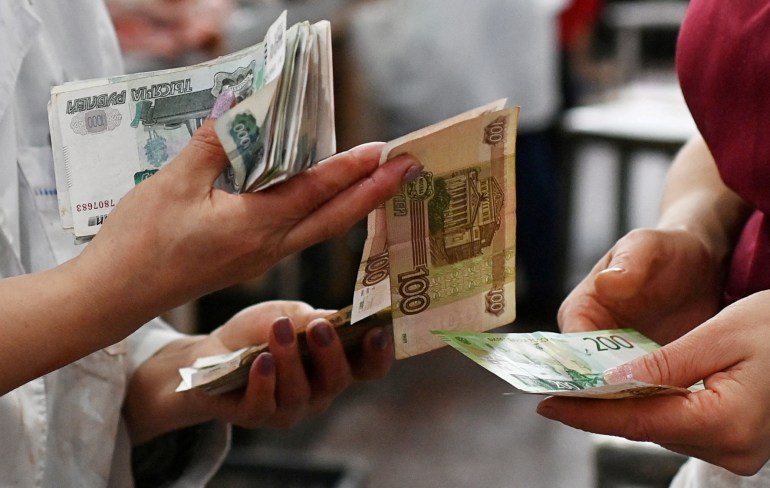
US envoy to the UN says Washington committed to diplomacy
The US ambassador to the United Nations says Washington is continuing to pursue a diplomatic solution to the crisis.
“Our hope is that this will work and that Putin will understand that war and confrontation is not the path that he wants to follow,” Linda Thomas Greenfield told US broadcaster National Public Radio.
Greenfield also called Monday’s meeting of the UN Security Council “an absolute success”, saying the fractious discussions allowed Washington to publicly reject Moscow’s “propaganda campaign”.
Ukraine crisis a ‘stress test for NATO’: Analyst
Theresa Fallon, the founder and director of the Brussels-based Centre for Russia Europe Asia Studies think-tank, says the crisis represents a “stress test for NATO” and US allies and there is currently a “lack of clarity” within Europe over how to respond.
“Putin’s actions are showing small hairline fractures in the alliance,” Fallon told Al Jazeera from the Belgian capital. “We saw last week that … Italy had online discussions with Putin through its [Italian-Russian] chamber of commerce … and it was recently announced that Orban is going to try and make an energy deal with Moscow.
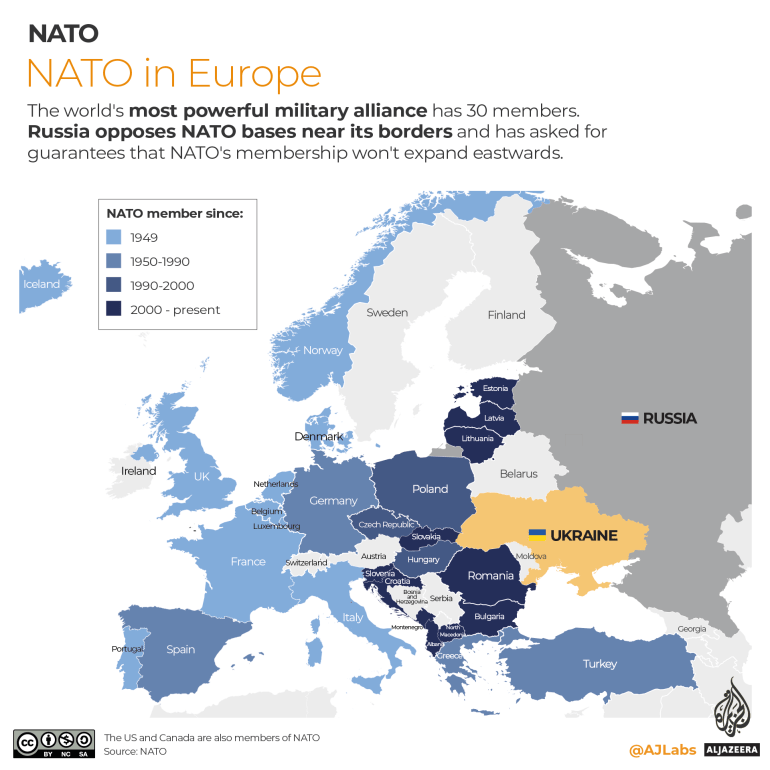
Italian PM discusses Ukraine crisis with Putin
Italian Prime Minister Mario Draghi held talks by phone with Putin, his office says in a statement.
The two leaders agreed on the need to find a “sustainable and lasting solution” to the crisis and to rebuild a “climate of trust”, the statement said.
Draghi also highlighted the importance of reducing tensions “in the light of the serious consequences that a further escalation of the crisis would have”.
Finland preparing response to Moscow’s security demands, FM says
Finland is putting together a response to a letter it has received from Russia requesting security guarantees from OSCE countries, Foreign Minister Pekka Haavisto says.
Finland, which received the correspondence on Tuesday, shares a long border and a difficult history with Russia but is not a NATO member.
“This exchange is about the [Russian] thought that the West has added its own security at Russia’s expense. Obviously, the West has a completely different view on this,” Haavisto told reporters in Helsinki.
Driven by ‘need’ to protect Ukraine, Britons fight on front line
Alongside thousands of Ukrainian troops battling Russia-backed separatists in eastern Ukraine are a handful of British nationals, who say they are driven to defend their adopted homeland by a sense of duty.
Read more here.
Ukraine, UK and Poland preparing trilateral security pact, Kyiv says
The United Kingdom, Poland and Ukraine are preparing a trilateral pact to strengthen regional security, Ukraine’s Prime Minister Denys Shmygal says.
“I hope that in the near future we will be able to officially launch a new regional format of cooperation … [and] in the context of ongoing Russian aggression, we should sign a trilateral document on cooperation to strengthen regional security,” Shmygal said while hosting his Polish counterpart Mateusz Morawiecki in Kyiv.
Russia bemused by Western concerns over troop buildup
Al Jazeera’s Dorsa Jabbari, reporting from Moscow, says Russia is bemused by Western concerns over its troop buildup near Ukraine’s border given it staged military drills involving what the Kremlin claims were even larger numbers of servicemen last April.
“Russian officials say there was not this much concern at that time … so they believe that there is now rhetoric and false information coming from the US with the aim of trying to destabilise Russia’s relationship with Ukraine,” Jabbari said.
Kyiv said at the time that Russia had massed 120,000 soldiers near the Ukrainian border in April 2021, a concentration of forces that Kyiv’s Western allies claimed was larger than the one mobilised by Moscow when it seized the Crimean Peninsula in 2014.
The Ukraine-Russia crisis in infographics
Al Jazeera has put together a series of infographics that explain the background of the Ukraine-Russia crisis.
Have a look here.
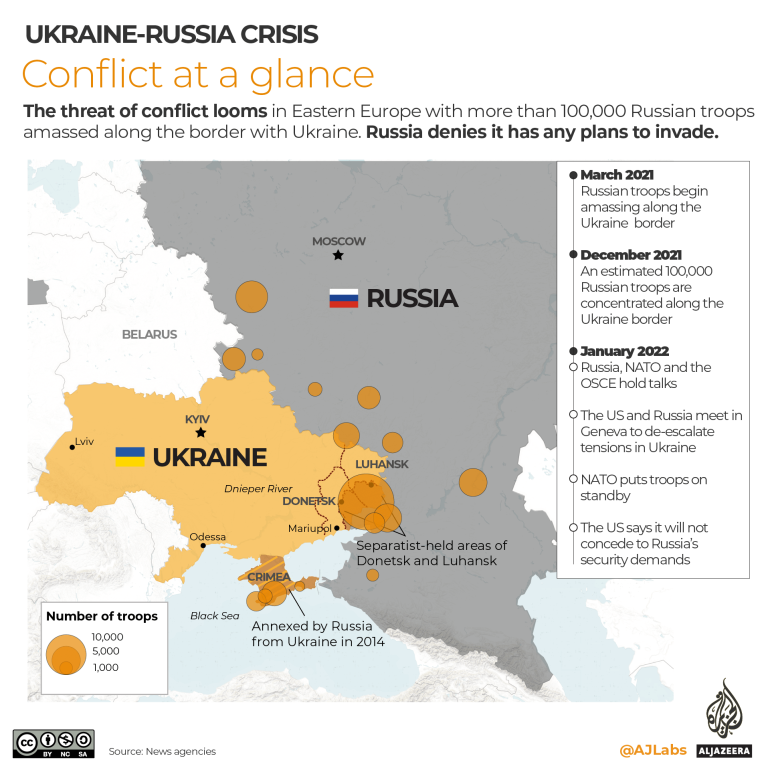
Putin preparing to host Hungary’s Orban
Putin is readying for talks with Orban, who has taken a softer line on the Ukraine crisis than other fellow NATO and European Union member states.
The Kremlin said before the meeting the leaders would discuss bilateral ties as well as “security issues on the European continent and regional conflicts”, an allusion to the standoff between Russia and the West over Ukraine.
Orban has said he will seek an agreement to increase Hungary’s gas imports from Russia at a time when some in Europe accuse Moscow of orchestrating an energy crisis to pressure European countries.

Blinken-Lavrov talks
The phone call between Blinken and Lavrov is expected to take place at mid-morning local time in Washington, DC.
The pair last spoke on January 21 at a face-to-face meeting in Geneva, during which they failed to reach an agreement on de-escalating the Ukraine crisis.
Their high-level meeting took place before the US and NATO had submitted their counterproposals to Russia’s security demands.
Erdogan to visit Ukraine this week: Report
Turkish President Recep Tayyip Erdogan will visit Ukraine on Thursday as Ankara continues to try and position itself as a mediator in the crisis, according to a report by Turkey’s Duvar English news website.
Citing an unnamed senior official, Duvar English reported that Erdogan will hold talks with Zelenskyy during his trip to Kyiv.
The official said plans were also being made for Putin to visit Turkey following the Beijing Winter Olympics, which are being held in the Chinese capital from February 4 to 20.
US orders embassy workers’ relatives to leave Belarus
The US State Department has ordered the family members of the staff at its embassy in Belarus to leave the country.
The move, announced in updated guidance issued on Monday, came as the department also warned US citizens against travel to Belarus due to an “unusual and concerning Russian military buildup” along Belarus’s border with Ukraine.
Poland prepared to supply Ukraine with military aid: PM
Morawiecki says Warsaw is ready to supply Ukraine with military aid including ammunition and various types of drones.
“We stand in solidarity with our Ukrainian neighbours in light of the threat they are now facing from Russia. However, solidarity and words are not enough today; now they need to be forged into action,” the Polish prime minister told a briefing for the media in the country’s capital.
“For this and other reasons, which are related to the very threatening military situation, which, unfortunately, has developed there, we are also ready to hand over defensive weapons.”
UK PM to visit Ukraine
Johnson will visit Kyiv in a demonstration of support for Ukraine, his office says.
Johnson will hold talks with Zelenskyy during Tuesday’s trip and urged Russia to “step back and engage in dialogue to find a diplomatic resolution” prior to departing London.
“It is the right of every Ukrainian to determine how they are governed. As a friend and a democratic partner, the UK will continue to uphold Ukraine’s sovereignty in the face of those who seek to destroy it,” he said in a statement.
Zelenskyy pledges to expand Ukrainian army
Ukraine will increase the size of its armed forces by 100,000 people over three years, Zelenskyy says.
Addressing Ukraine’s Parliament, the president told legislators to stay united and not sow panic about the threat of a Russian military offensive.
“This decree [was prepared] not because we will soon have a war … but so that soon and in the future there will be peace in Ukraine,” he said, adding he hoped the date of another round of peace talks with Russia, France and Germany would be agreed soon.
‘We are not going to back away’: Russian embassy in US
Russia’s embassy in Washington says Moscow will not back down in the face of sanctions threats from the US and its Western allies over Ukraine.
“We are not going to back away and stand at attention, listening to the threats of US sanctions,” the embassy said in a post on Facebook, adding that it is “Washington, not Moscow, that generates tensions”.
UK reiterates sanctions warning
The UK has again warned the Russian president.
“The critical message that Vladimir Putin needs to be getting and is getting because of the role that this prime minister has taken is: There will be severe economic costs if he pursues an invasion of Ukraine,” UK Deputy Prime Minister Dominic Raab told Times Radio.
Johnson was expected to call Putin on Monday but was mired in scandal at home after a report into alleged lockdown-breaking parties was published.
Asked if the prime minister cancelled the call with Putin, Raab said he did not know the details, as a government statement said on Tuesday: “In an important week for diplomacy, the PM will step up diplomatic efforts and hopes to speak President Putin and other leaders this week.”
Russia denies replying to US counterproposals
Russian Deputy Foreign Minister Alexander Grushko has denied reports that Moscow gave the US a written response to Washington’s counterproposals on its security demands, according to the RIA Novosti news agency.
A State Department spokesperson said on Monday that the US has received a written follow-up from Russia on the matter.
